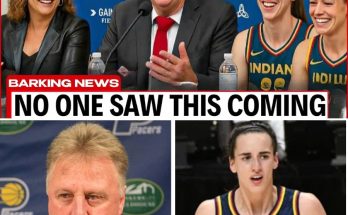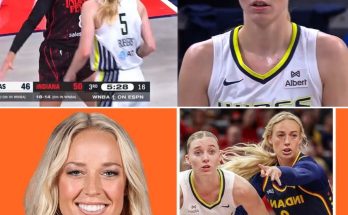
The Women’s National Basketball Association is facing a wave of controversy as reports emerge that star guard Caitlin Clark has signed a record-breaking contract to play in Europe during the off-season. The deal, confirmed by multiple sources and widely reported by international media, has sparked anger and frustration among several WNBA players who feel blindsided by the terms, the magnitude of the contract, and the broader implications for the league and player compensation. Social media erupted within minutes of the news, with players, analysts, and fans weighing in on the unprecedented nature of the agreement and the tensions it has exposed within professional women’s basketball.
Caitlin Clark’s European contract reportedly exceeds previous overseas deals by a significant margin, positioning her as one of the highest-paid female basketball players globally. While overseas play during the WNBA off-season is not uncommon, the scale of Clark’s deal has highlighted disparities in compensation, contractual freedom, and the financial incentives available to elite players outside of the league. Many WNBA players have expressed frustration at the lack of parity and the perceived favoritism toward a single marquee athlete. The situation has reignited debates about wage equality, league revenue distribution, and the sustainability of the WNBA’s current pay structure.
Players’ reactions have been swift and pointed. Some have publicly criticized Clark, framing the contract as a move that could undermine team cohesion, league loyalty, and the competitive balance of the sport. Others have used more measured language, expressing concern over the message the deal sends about player value, equity, and the options available to athletes seeking financial security. Discussions on social media and in locker rooms reportedly center on the tension between personal financial advancement and collective league solidarity, highlighting a divide between star players and the broader player base.
The WNBA itself is navigating a delicate situation. League officials have acknowledged the news but have been careful to avoid direct commentary on Clark’s contract, emphasizing respect for players’ autonomy and international opportunities. However, internal discussions are reportedly underway regarding potential adjustments to league compensation, contract negotiation rules, and offseason participation policies. Executives face the challenge of maintaining player morale, competitive integrity, and public confidence while respecting the legal and contractual rights of high-profile athletes like Clark.
Analysts note that this controversy reflects broader trends in women’s professional sports, where top talent often seeks higher compensation overseas due to financial limitations within domestic leagues. European clubs are able to offer significantly larger contracts than those currently available in the WNBA, creating a competitive environment that encourages players to explore opportunities abroad. While this provides individual financial benefits, it can strain relationships within the league and raise questions about loyalty, team focus, and the long-term growth of the WNBA’s brand.
Fans have also been vocal in their reactions. Social media platforms are flooded with debates, memes, and opinion threads analyzing Clark’s deal, the potential impact on her WNBA performance, and the wider consequences for player salaries. Many supporters celebrate her success and ability to secure a lucrative contract, while others worry that the headline-grabbing deal could fuel division among teammates and destabilize team chemistry. Public sentiment underscores the complex intersection of player ambition, financial realities, and league expectations in modern women’s basketball.
The controversy is further complicated by timing, as Clark’s European contract comes amid a season in which the WNBA is striving to increase visibility, attendance, and television ratings. Star players participating overseas can affect preparation, fatigue, and availability for domestic games, creating strategic challenges for teams and coaches. Observers predict that Clark’s dual commitments will be scrutinized in the media, potentially influencing narratives about commitment, professionalism, and the balance between financial opportunity and league loyalty.
In conclusion, Caitlin Clark’s record-breaking Europe deal has sparked immediate and intense reactions across the WNBA, highlighting tensions between individual financial advancement and collective league interests. Players’ anger, league deliberations, and fan debate illustrate the complex dynamics at play when a marquee athlete pursues unprecedented overseas opportunities. As the situation unfolds, the WNBA faces the challenge of addressing player concerns, maintaining competitive integrity, and fostering a sustainable environment in which both elite and emerging athletes can thrive. The coming months will reveal whether this deal becomes a catalyst for broader reform in compensation, international participation, and league policies, shaping the future landscape of professional women’s basketball.



